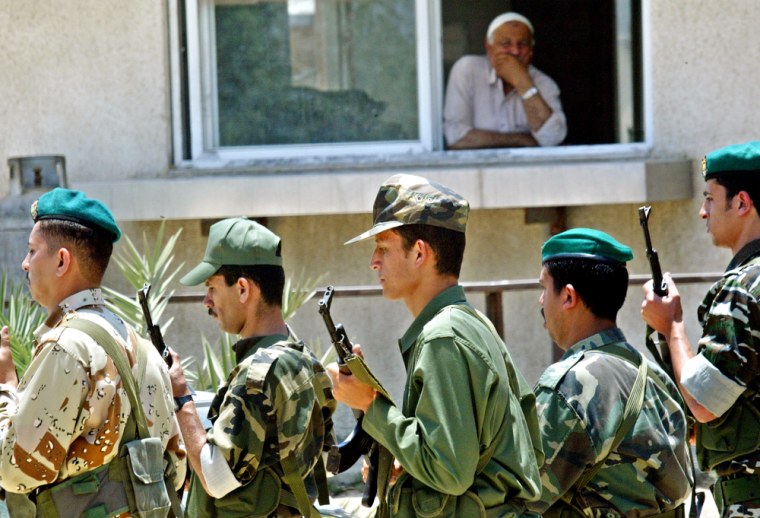On the eve of a visit by an Egyptian mediator, Palestinian officials sent conflicting signals Tuesday on how much involvement they will accept from their neighbor after an Israeli withdrawal from the Gaza Strip.
Egypt and the Palestinians have a historically uneasy relationship, and Egypt’s proposed role in securing Gaza — once ruled by Cairo — has many Palestinians worried they’ll be replacing one occupation with another.
Egypt demands that in preparation for an Israeli withdrawal, Palestinian leader Yasser Arafat restructure his tangled security forces and relinquish some control over them. It also wants to send 200 military advisers to Gaza to retrain Palestinian security forces.
Palestinians are wary. An Arafat ally said Tuesday that Egypt shouldn’t meddle or press for security reform, and Palestinian militants angrily rejected any planned Egyptian security role in Gaza. Palestinian Foreign Minister Nabil Shaath tried to soften the rare criticism by saying Cairo’s help is welcome.
Israel rebuffs Cairo demand
Complicating matters further, Israel is resisting an Egyptian demand that it halt military activities in Gaza after the advisers arrive there, an Israeli official said on condition of anonymity. However, Israel expects to be able to reach a compromise on the matter, the official said.
With Israel shunning the Palestinians as unreliable negotiating partners, Egypt — fearing chaos on its border with Gaza — has been trying to ensure order there after a pullout, planned for next year. The latest dispute threatens those efforts and leaves Gaza’s future uncertain.
Egypt has a rocky history with the Palestinians. It took little responsibility for the Palestinians in Gaza when it ruled the region before Israel captured it in 1967 and worked to keep Palestinian refugees out of the country. That did not prevent Egyptian leaders from using the Palestinian cause to try to galvanize the Arab world behind its leadership.
But as the most influential Arab country at peace with Israel, it is now a key broker in the region.
Egyptian official in talks Wednesday
Egyptian intelligence chief Omar Suleiman was to hold talks Wednesday in Jerusalem with Foreign Minister Silvan Shalom and Defense Minister Shaul Mofaz. Afterward, he was to go to Ramallah to meet with Arafat.
Arafat has resisted past reform demands, and analysts say the Egyptian requirements have put him in a difficult position: If he accedes, he will give up a major source of his power, but if he resists, he could lose one of his few remaining allies.
“Arafat will not relinquish his power over the security forces unless he felt that his relationship with the Egyptians was threatened,” Palestinian analyst Khalil Shikaki said.
With the Palestinians preparing for Suleiman’s visit, Arafat ally Sakher Habash criticized the proposed Egyptian role in Gaza. “We don’t want to be cut off from Egypt, and at the same time we don’t want Egyptian interference,” said Habash, a member of the ruling Fatah movement’s influential Central Committee.
“As far as Fatah is concerned, demands that Arafat relinquish some of his powers are unacceptable and the Egyptians are well aware of this,” he said. At best, Habash said, there would be increased cooperation between the security branches, but under Arafat’s control.
Palestinian militants oppose Egyptian overture
The Egyptian efforts have also come under fire from Palestinian militant groups that met late Monday in Damascus, Syria. The groups, which included Hamas and Islamic Jihad, issued a statement indirectly criticizing Egypt and Jordan, which is considering a security role in the West Bank.
“We express our dismay and surprise over a security role for certain Arab parties in the Gaza Strip and the West Bank,” the statement said.
The militants appeared concerned that Egypt is planning to retake control of Gaza.
Israeli officials say they hope for a strong Egyptian role in Gaza.
Egyptian Foreign Minister Ahmed Maher said he believes that regardless of the militants’ statement, the Palestinians will accept the Egyptian advisers.
“I know the Palestinian people appreciate the role played by Egypt (and) I don’t believe any Palestinian can ever consider attacking any member of an Egyptian group that is going to be sent to Palestine,” said Maher, adding that Israel and Palestinian militants had to agree to a cease-fire before the advisers could be sent.
Palestinian Foreign Minister Nabil Shaath said the Palestinian Authority was pleased with Egypt’s involvement and suggested that perhaps some of the militants misunderstood the Egyptian role. “They are coming as advisers and as experts, not as rulers,” Shaath said.
Shaath reiterated that Arafat has accepted the Egyptian security proposals in general, but he gave no evidence that a plan had been prepared. Arafat was to present a plan on security reform to Suleiman on Wednesday.
Gaza’s top security chief, Maj. Gen. Abdel Razek Majaidie, said Tuesday the Palestinian security forces are ready to take control of Gaza after an Israeli withdrawal, and added that the various security agencies had been incorporated under his command. It was unclear whether the changes would meet Egypt’s demands.
Other developments
In new Gaza violence Tuesday, Israeli troops killed two Palestinians. The army said it had fired at two gunmen who approached its soldiers in the northern Gaza Strip.
Palestinian security forces said the military moved into the area in the morning and sent bulldozers to raze several farms to build a road. The Palestinians said the two were killed and six others wounded when the army fired a tank shell toward a group of people.
Also Tuesday, U.S. Ambassador Daniel Kurtzer said Israel must live up to promises to dismantle dozens of West Bank outposts and freeze settlement building. “This is something that Israel undertook to do, and therefore, sure, we expect them to be fulfilled,” Kurtzer told Israel Army Radio.
An Israeli official said Israel was trying to remove outposts, but was slowed by court appeals by settlers. Israel never stopped building in the veteran settlements, even after its acceptance last year of the U.S.-backed “road map” peace plan, which calls for a halt to construction.
